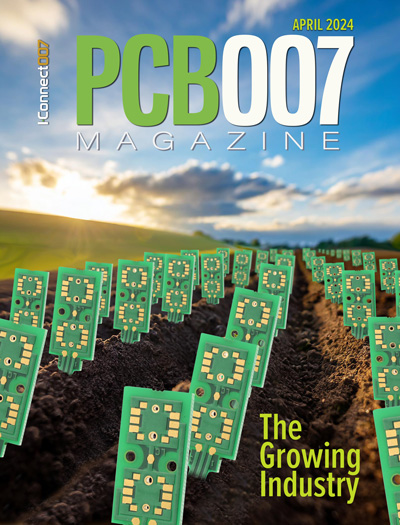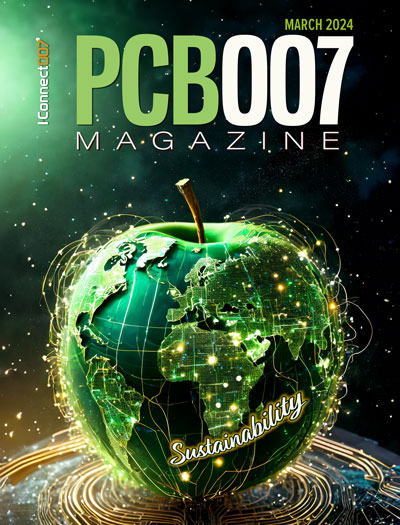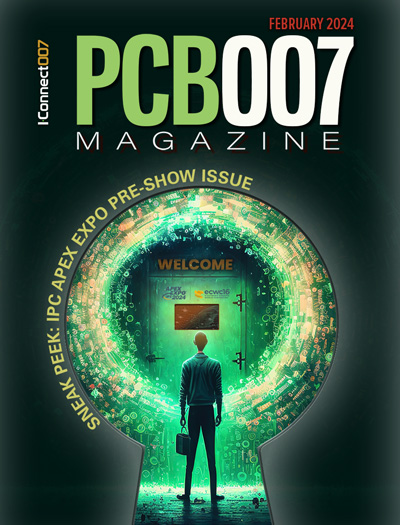-

- News
- Books
Featured Books
- pcb007 Magazine
Latest Issues
Current Issue
The Growing Industry
In this issue of PCB007 Magazine, we talk with leading economic experts, advocacy specialists in Washington, D.C., and PCB company leadership to get a well-rounded picture of what’s happening in the industry today. Don’t miss it.

The Sustainability Issue
Sustainability is one of the most widely used terms in business today, especially for electronics and manufacturing but what does it mean to you? We explore the environmental, business, and economic impacts.

The Fabricator’s Guide to IPC APEX EXPO
This issue previews many of the important events taking place at this year's show and highlights some changes and opportunities. So, buckle up. We are counting down to IPC APEX EXPO 2024.
- Articles
- Columns
Search Console
- Links
- Events
||| MENU - pcb007 Magazine
Rex Rozario’s Next Big Thing, Part 1
October 24, 2017 | Barry Matties, I-Connect007Estimated reading time: 11 minutes
Barry Matties joins Rex Rozario at Lympstone Manor, one of Rex’s investments outside of the electronics industry. The property, once an old country house in the Exeter countryside, has been transformed into a splendid hotel and restaurant. Joining them is Michael Caines, a Michelin Star chef from the UK who is heading the project.
Barry Matties: Rex, tell us a little bit about this project, which is well outside of the electronics industry.
Rex Rozario: Well, I’ve always had an interest in hotels; I’ve been looking at things like this. There was a manor house many years ago. It was always in the back of my mind to get in one, and of course, I used to visit the Royal Clarence, and this is where I met Michael. This has carried onward since then. There was Gidleigh Park, and so we have been there a few times.
Also, whenever I went into some of the CBI conferences, there was always a Michael Caines restaurant in the hotel. We had the Rural Development Agency, and Michael and I got sort of lured in to be ambassadors to go around and promote. We had some great people with us, a great DJ and a wonderful actress from “The Railway Children.” She was an ambassador as well. We were at a distance, but we were in town.
Matties: You guys have known each other for some years now?
Rozario: Yeah, and of course, I have Rendezvous, a wine bar and restaurant in Exeter.
Matties: We were there last night. Quite delicious.
Rozario: It is across the road from the very elaborate Royal Clarence. So we kept in touch. I’ve been sort of following Michael, because he's like a local hero. I’m also interested in chefs, and there are only a few of them in the UK with Michelin Stars, so that was a big attraction.
Matties: Michael, can you tell us about your Michelin Star status?
Michael Caines: At Gidleigh Park, I had two Michelin Stars for 18 years. I decided that it was time to leave after 21 years; that must have been around about 19 years ago. I kind of thought that it’s my time to move on and do something for myself. I just started talking about that as an idea. I have a business partner, and my accountant, David, who’s always helped me with very different things. We set up the restaurant at the Royal Clarence, which then became a joint venture with Mr. Brownsword. He’s a very successful businessman in the UK, and based here in the Southwest.
Then we did the ABode Hotels, which is what Rex was referring to, where he used to go to hotels where my restaurant was within. Of course, along the way, you meet these great people within our local business community who frequent and dine, and they’ve all ended up being investors in this project. For me, the start point of the whole project was about trying to fulfill my own ambition and realize my own dream.
Having spent many, many years representing the Southwest and championing the cause of it, and doing lots of things for other people, it felt like it was time to do something for myself. That was important. I realized to do that, I had to leave my current arrangement with Mr. Brownsword, which was quite a lengthy process. It was done in a very amicable and very supportive way, and it left me then the ability to be independent and think about what I wanted to do.
Which, I think when you spend a lot of time working for someone else, that takes a bit of time to then work out what you feel is right for yourself. I didn’t want to go to London. I didn’t want to leave the southwest. If I was going to stay in the southwest, what type of business would it be that I’d like to try and find, and where would I want to be if I could? That just became so much the focus of my attention. They say in life, and in business, "The best time to plant a tree is 20 years ago. If you haven’t done it then, then it’s today."
I thought, "Well, I'd better get on with it." I wouldn’t say I was running out of time, but I felt that I was at the peak. 18 years at two stars, very successful track record, but I had to do something for myself. That opportunity doesn't come around very often, and you have to make that opportunity happen. So I started thinking about how I could do that.
Matties: You started this project about a year ago?
Caines: Well, this is three years since I left.
Matties: Three years in the making.
Caines: Yeah. If you can think back by year, I started thinking about what I should do in 2016. 2013 and 2014 was the year where I said I was going to leave. In 2014, I was looking at how I might formulate a business memorandum, which obviously you need to send to your potential investors. In 2014, I started looking at potential properties. I wanted to be in East Devon. It was a very good area. I wanted to be local to my hometown, Exeter.
I looked at Rockbeare Manor just outside of Exeter, and then I looked at Combe House. It was while I was looking at Combe House, which was an existing hotel, that somebody said, "You should come have a look at this Cortland’s Estate, which is called Cortland’s Mansion. It’s got amazing views." I didn’t know it existed. I came here, saw it in July 2014, and realized that this was it. This was the place.
Matties: You knew immediately?
Caines: Immediately, yeah. By 2014, we put in an offer. It was accepted in August. Then I had one or two potential investors saying, "Well, it sounds good." I had the money I had got out of my previous business arrangement that I put in to get the deposit and safeguard it, and start to pay for the planning, the architectural work, and the plans. So I could put it together as a memorandum.
Then we finally exchanged in November, and once I did that, I could then go public on it. I put together a little bit of a press release, and then we had a black book of people, potentially, and I got an email from Rex saying that he’d read about my new venture and that he’d love to get involved. That was fantastic, because we had that connection as we'd met before, but I didn’t want to take that for granted. We had a chat, and I went to see him with Martin, a business investor.Page 1 of 2
Suggested Items
Digitalisation and ESG
04/19/2024 | Marina Hornasek-Metzl, AT&SDigitalisation and ESG are prominent and high-priority topics in the global business community. The first focuses on applying technology throughout the value chain to produce faster, smarter, and more desirable business outcomes. The latter emphasises the broader value a business is expected to create for its stakeholders from an environmental, social, and governance perspective.
IPC Bestows Posthumous Hall of Fame Award to Industry Icon Michael Ford
04/18/2024 | IPCIPC honored the late Michael Ford, Aegis Software, for his extraordinary contributions to the global electronics manufacturing industry with the IPC Raymond E. Pritchard Hall of Fame Award at IPC APEX EXPO 2024. IPC’s most prestigious honor, the Hall of Fame Award is given to individuals who have provided exceptional service and advancement to IPC and the electronics industry. Ford, an industry leader and valued IPC volunteer, died suddenly in January 2024.
ZESTRON Welcomes Angela Marquez as Head of Business Unit, Latin America
04/17/2024 | ZESTRONZESTRON, the leading global provider of high-precision cleaning products, services, and training solutions in the electronics manufacturing and semiconductor industries, is delighted to announce Angela Marquez's appointment as the new Head of the Business Unit for Latin America.
Nano Dimension Refreshes Corporate Governance by Appointing Major General (Ret.) Eitan Ben-Eliahu to the Company’s Board of Directors
04/16/2024 | Nano DimensionNano Dimension Ltd., a leading supplier of Additively Manufactured Electronics (AME) and multi-dimensional polymer, metal & ceramic Additive Manufacturing (AM) 3D printing solutions, today announced that Major General (Ret.) Eitan Ben-Eliahu is joining its Board of Directors.
Dan’s Biz Bookshelf: Seeing the How
04/11/2024 | Dan Beaulieu -- Column: Dan's Biz BookshelfI might say this about a lot of books, but this one is a must-read. The author addresses a whole new way of doing business. It’s not like one day we woke up and there it was, a new way to get a ride (Uber), a new home away from home (Airbnb), a new way to get groceries (Instacart) and (DoorDash), and so on. The flood gates have opened, and there’s more to come.


